How buying a house from a parent can solve a real estate challenge
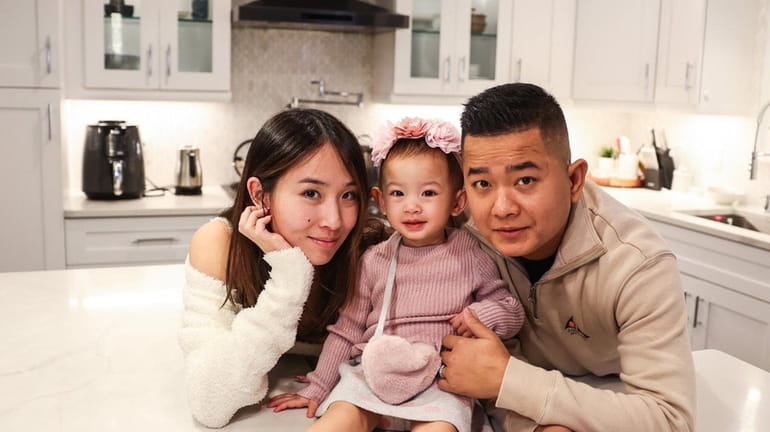
Thiri Oo and Oakar Reinstein with their daughter, Emma, at the Sayville home where Reinstein grew up. Reinstein bought the home from his parents and has been renovating it. Credit: Newsday/Steve Pfost
When David Leibstein's parents started spending more and more time at their Florida vacation home, they considered moving there for keeps, but didn’t want to give up their Oceanside abode. Meanwhile, David and his wife, Mira, who were living with them while starting their careers, were shopping for a home themselves.
The eureka moment came when mom and dad offered to let them buy the residence they had owned for 40 years. The two refinanced and purchased it in 2000. Afterward, David’s parents moved to Florida and he kept a room for them to visit in Oceanside.
"It was a generous thing for them to do," he says. "And the fact that we didn’t have to go house-hunting and deal with the whole mortgage thing avoided a lot of hassle."
Finding a home in today’s market is daunting. For a lucky few, family is the answer.
"Houses are hard to come by these days, so we jumped at the opportunity," says Casey Ahearn, who with her husband, Joseph, bought her grandparents’ home in Centerport last March. "It meant a lot to me to keep it in the family."
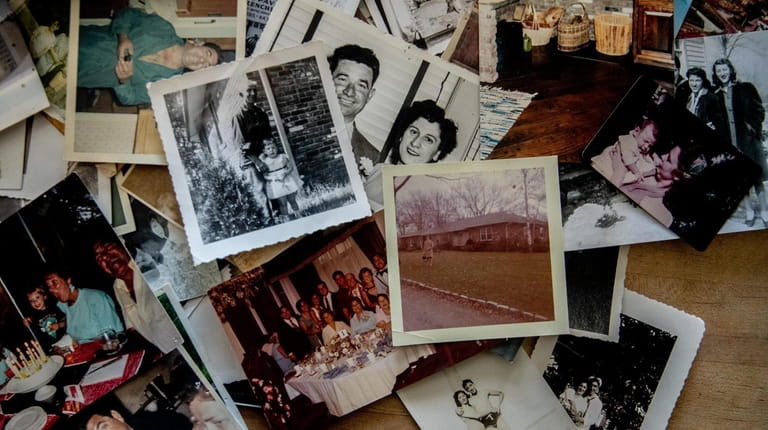
Family photos of Jenice Sesti, who lives in her childhood home in Centerport, which her father built in 1952. She is shown as a toddler at the house standing with an uncle in the black and white picture in the middle. Credit: Raychel Brightman
Few statistics are available about how many parents or grandparents sell their homes to offspring primarily since such data is gathered through mortgage agents who usually are circumvented by the action. But it may become more common as boomers settle into retirement and their offspring face steep competition in the homebuying market.
For one thing, the kids are there already. A 2020 Pew Research Center analysis of census data revealed that 52% of 18-to-29-year-olds live with their parents. This perhaps is a reflection that homeownership is out of financial reach for many young people. It also increases the chance they might buy or inherit the home from sympathetic parents.
Leaving home can be liberating, a chance to grow as an individual and question accepted perceptions. But for others, staying put is fine.
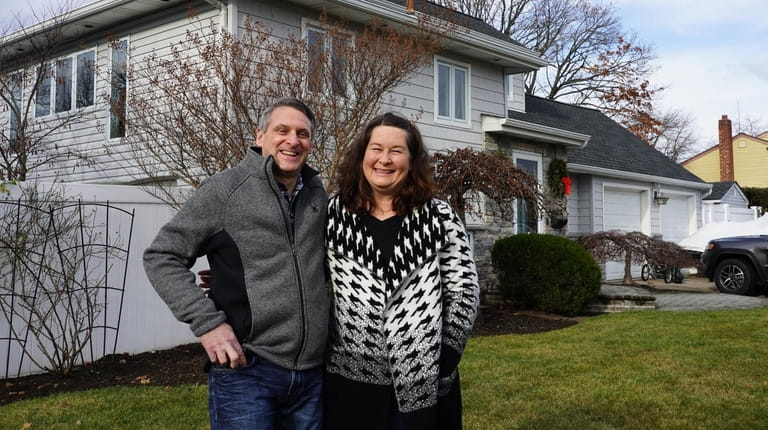
David and Mira Leibstein bought their Oceanside home from David's parents, allowing them to skip househunting. "It was a generous thing for them to do," David says. Credit: Debbie Egan-Chin
Leibstein, 56, an optometrist with offices in Rockville Centre and throughout the Island, is OK with it because of his carefree childhood. "We went to the beach a lot," he says. "We had our own little boat. Growing up here was a great experience. I wouldn’t exchange it with anyone."
The good vibe was enhanced by the fact that the house was close to work and good schools. It also allowed him to stay in touch with his brothers and cousins who live in the area.
Deciding what to upgrade
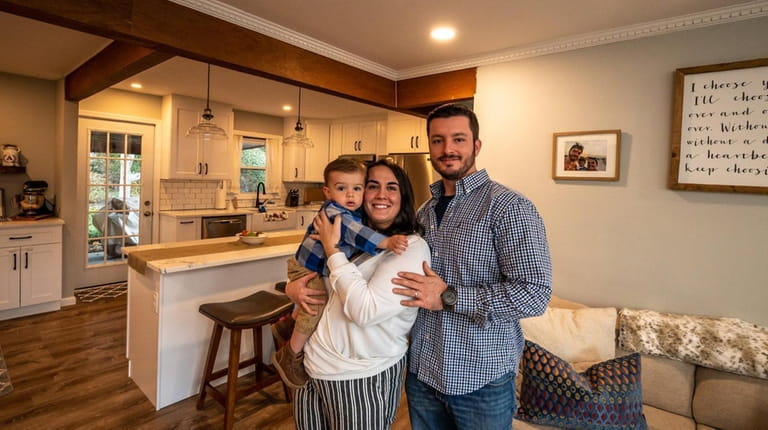
Casey and Joseph Ahearn, with their son, Joseph, at their Centerport home, which had belonged to her grandparents and which is full of memories of family gatherings. Credit: Newsday/J. Conrad Williams Jr.
Over the years the Leibsteins have undertaken renovations including upgrading the windows, remodeling the kitchen, putting on new siding and landscaping the grounds, says Mira, 53, a pharmacy tech for a veterinarian firm.
"The thing I was happiest to see go was the pink bathroom," she says.
Is it strange reoccupying a home you are so familiar with?
Sort of, according to Casey Ahearn, who lives in an expanded Cape in Centerport built in the 1950s by her plumber grandfather and his contractor pals.
"It was a little weird at first," says the 29-year-old nurse. "But it’s a good feeling. I think my grandparents would be happy knowing it’s still in the family."
She and her husband, Joseph, 37, a physical education teacher, assumed one of her grandparents' four living offspring would buy the home after their mother died in 2019, but none expressed interest. She and her husband, who were living in an apartment in Huntington, bought it in March for $500,000. The two have a 1½-year-old son and plan to have more kids.
"I was thrilled to be able to raise my family where my mother grew up and where I feel like I grew up, too," she says.
They, too, have upgraded, but not everything. For example, they are keeping the dining room with its massive table as is. That’s where the clan gathered for festive meals. They also are preserving the fireplace where 10 stockings hung on the chimney each Christmas for the grandchildren. "It was always loud and energetic at holidays," says Ahearn.
A father's dream
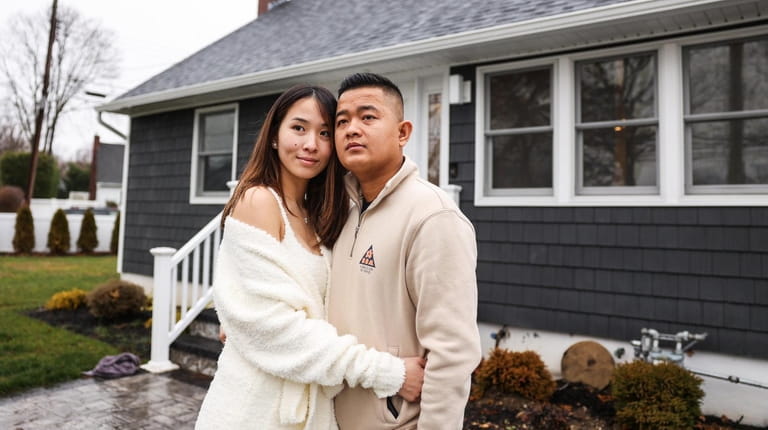
Thiri Oo and Oakar Reinstein at their home in Sayville, where Reinstein where he grew up with four brothers and three stepbrothers. Credit: Newsday/Steve Pfost
Summertime fun was ongoing at Oakar Reinstein’s home in Sayville, where he grew up with four brothers and three stepbrothers. Much of it took place around the backyard swimming pool.
"It was a crappy little pool with a giant deck, but we really enjoyed it," says Reinstein, a Realtor with Realty Connect USA in Patchogue.
The small house wasn’t in great shape either, but it remained the holiday gathering site for the combined families. Reinstein was 12 when he and his brothers left Myanmar to join their divorced mother, who had moved to Queens years earlier to find work. That was where she met and married his stepfather, who also was divorced and had three of his own children. Reinstein took his stepfather's last name and said he refers to him as his father.
His parents bought the Sayville home in 2003 for $250,000. The boys bunked up together in the small bedrooms and basement. They remain close, Reinstein says.
Experiences like this explain why, after his parents decided to move to Virginia, they all felt a tug at the heart when the home was put up for sale.
"It just didn’t feel right," says Reinstein. "It was so emotional for my parents and myself that I ended up buying it."
He purchased the home for $325,000 in 2018. Since then, he has fulfilled his father’s dream of renovating the residence both inside and out, including expanding the primary bedroom, replacing the dilapidated pool and adding an outdoor kitchen and dining area. He lives there with his wife, Thiri Oo, 28, an accountant, and their 18-month-old daughter, Emma.
Occasionally, he feels a strange sense of déjà vu waking up in the same, but renovated home, he says. Still, moving back has been a nostalgic kick.
"I love my neighbors," he says. "They literally watched me grow up. So, it’s a really warm feeling to be back here with them."
Precious memories
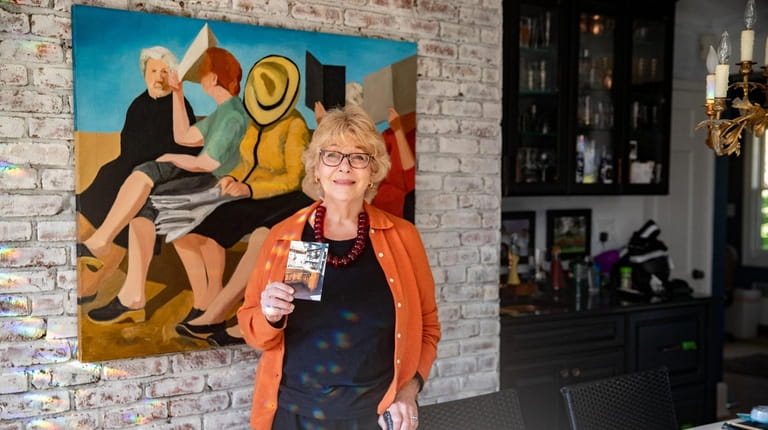
Jenice Sesti with a photo of relatives in the original kitchen of her Centerport home, before it was renovated. Credit: Raychel Brightman
A treasured past also is the main reason Jenice Sesti, 69, decided to move back to her childhood home, also in Centerport.
"I couldn’t bear to leave the memories," she says. "It was just too precious to let anyone else live here."
The home was built in 1952 by her father, who owned a construction business and erected many residences in the close-knit community. She retired as a construction manager for the firm and inherited the residence after her mother died in 2003. Sesti hopes one day one of her own children will take it over.
"When the time comes, I know they’ll figure out how to keep it in the family," she says.
Her father and one of her sons have their handprints in the concrete driveway. So many relatives lived in the vicinity that she could stop at seven houses walking home from school, she says.
"You couldn’t get away with anything, because someone was always around to catch you."
This kind of reverence is one reason she has tried to keep the home much the way it was back in her childhood days. That includes keeping — and adding to — the 1950s-style furniture throughout the house. Recently, she had some construction done in the laundry room and found three different kinds of wallpaper that had been put up over the years. She saved a piece of plasterboard with the samples on it.
"I couldn’t throw it away," she says. "It was too cool."
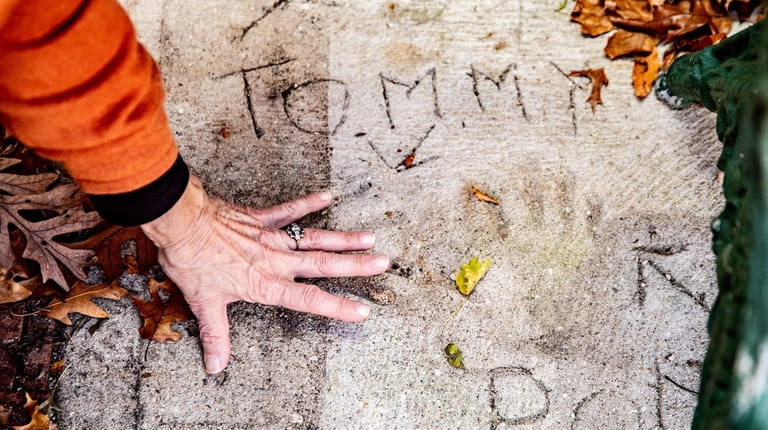
Jenice Sesti's father and one of her sons have their handprints in the concrete driveway of her Centerport home. Credit: Raychel Brightman
Yes, living there does seem unusual sometimes.
"Every once in a while I wonder what my mom and dad would think of what I'm doing here," she says. "I mean, I sleep in their bedroom. That was odd in the beginning. But I think my parents would be happy that I have honored their home."
Respecting the past is one reason David and Mira Leibstein built a new walkway around a weeping maple planted by his mother 30 years ago. She did not have a green thumb, David says. Still, the tree endured Superstorm Sandy and other onslaughts. They weren’t about to cut it down now.
"It’s the little things that remind you of a home’s history," Mira says.
Proceed, with caution
So you’re looking for a home on Long Island. Pickings are slim and prices shocking. But weren’t your parents talking about moving to a retirement home? Perhaps you could buy their place and return to your childhood abode? Win-win, right?
Sure, with a few caveats.
“It’s a great opportunity,” says Kevin Loiacono, a broker with BrookHampton Realty. “And for first-time homeowners in this market it may be the only opportunity.”
Positives are plentiful. First off, the folks might give you a bargain price as a loving gesture. You could save big bucks by avoiding broker commissions and lowering closing costs, or, the bank might let you assume the mortgage. Also, since you know the home’s condition, you also could eliminate costly contingencies like a house inspection.
Loiacono, president of the Long Island Board of Realtors, says to consider bringing in a real estate broker or a property attorney just to get the paperwork in order and make sure both sides know what to expect. After all, things can go wrong.
Parents, for instance, may have seller’s regret later and feel they sold their home too low and now need the money. Children who bought during a housing boom followed by a bust may be vexed to find their investment is worth less than anticipated.
Mom and dad also need to accept boundaries and realize they can’t drop in anytime like it’s still their place. They might not be pleased to discover the kids have renovated away some of their cherished additions, such as that homemade basement bar. Siblings could be bitter they weren't given the same opportunity to buy the home, perhaps because they didn’t have the financial means themselves.
The point is, says Loiacono, be careful.
“When you talk about a home you grew up in, you’re talking about something that’s personal.”
— JAMES KINDALL
